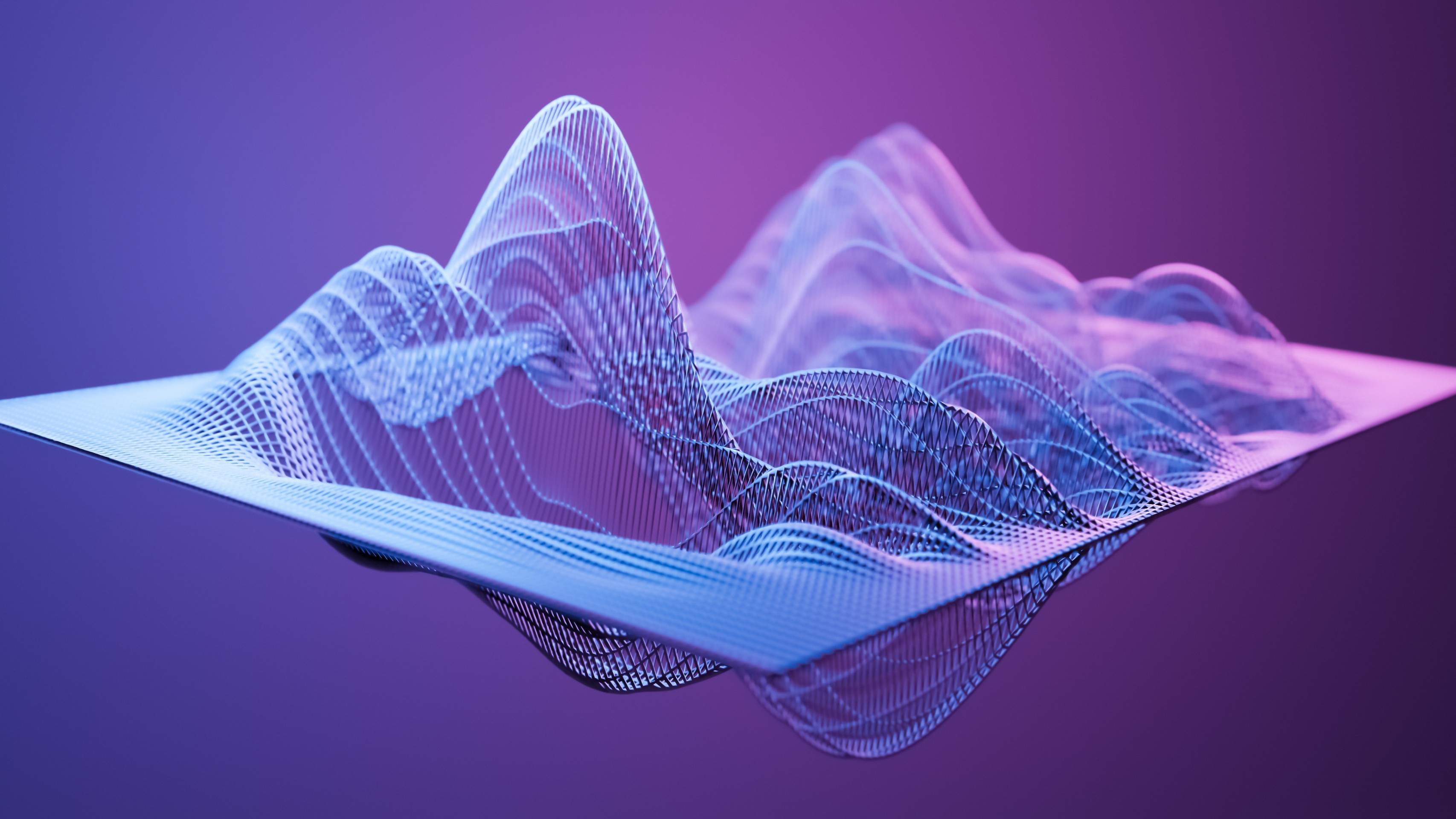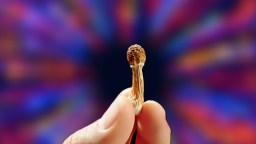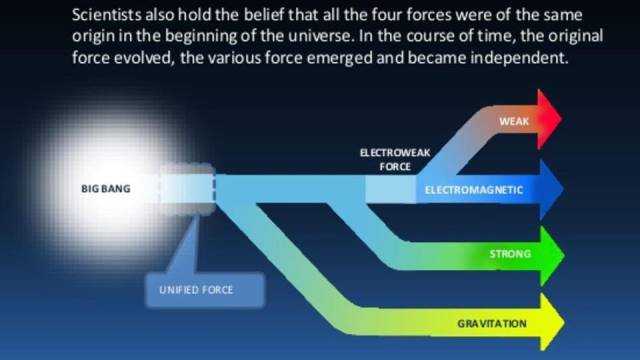Eyes wide shut: Why closing your eyes intensifies psychedelic trips

- A recent study highlights the importance of set and setting in psychedelic experiences, showing that keeping your eyes closed seems to enhance psychedelic effects, in part by more intensely increasing brain entropy.
- External stimuli like videos seem to diminish these effects by competing with the drug’s impact.
- These insights suggest that therapeutic psychedelic sessions could benefit from minimizing external distractions.
You’ve likely heard the phrase “set and setting” when it comes to psychedelics: The quality of a trip depends on the mindset you have and the environment you’re in when you kick off a trip. But while it’s a common claim, there hasn’t been much research on the effects of set and setting on the psychedelic experience.
To bridge that gap, a recent study systematically examined these kinds of effects, including those that result from keeping your eyes open or closed during an LSD experience. The results found that participants who kept their eyes closed tended to experience “stronger” trips, as evidenced by self-reported data and increased correlations with brain entropy, which refers to the heightened complexity and randomness in brain activity.
On a broader note, this study was the first quantitative analysis to find that the effect of setting in psychedelic experience can be directly gathered from physiological measurements. Another key finding? Visual stimuli, like watching videos, seem to distract the brain from an otherwise rich experience facilitated by closing one’s eyes.
Visuals or visions?
Psychedelics are known to increase brain entropy, which you can think of as a measure of how many different thoughts or images your brain can create at once. (For a contrasting example, people exhibit decreased brain entropy while undergoing general anesthesia or a loss of consciousness.) An increase in brain entropy often positively corresponds with the subjective richness of psychedelic experiences, an effect also observed in research on meditation and flow states associated with musical improvisation.
Brain entropy seems to be a key factor in gauging the therapeutic potential of psychedelics.
“…the therapeutic mechanisms of psychedelics are thought to depend on their acute entropy-enhancing effect, potentially reflecting a window of opportunity (and plasticity) mediating therapeutic change,” the researchers noted.
However, the power of those therapeutic effects may depend on set and setting, through factors like mood, expectations, and environment. So while psychedelics may reliably increase brain entropy, that increase doesn’t necessarily translate to therapeutic effects if the setting isn’t right.
In most psychedelic clinical trials to date, participants have been given eye shades (or instructed to close their eyes) and headphones for music. Meanwhile, some companies, such as ketamine clinics, are experimenting with pairing drug and video, hoping to enhance the effect of the drug with virtual images of “naturescapes” and other stimuli. However, no studies to date have systematically assessed the impact of set and setting on brain activity and subjective experience during a psychedelic experience.
Psychedelic settings
For the study — led by Pedro Mediano, Fernando Rosas, Robin Carhart-Harris, and a long list of other psychedelic researchers — 20 healthy people participated in two experimental sessions: one in which they received intravenous saline (placebo) and one in which they received intravenous LSD (75 μg). Whole-brain magnetoencephalography (MEG) data were collected under four conditions: resting state with eyes closed, listening to instrumental ambient music with eyes closed, resting state with eyes open (focusing on a “fixation dot”), and watching a silent nature documentary video. In addition, subjects filled out questionnaires after each session, rating their subjective experience of intensity, emotional arousal, ego dissolution, positive mood, and simple and complex imagery.
Compared to placebo, the researchers found that external stimuli increased entropy across conditions, with video yielding the highest absolute entropy. “It is noteworthy that the simple act of opening one’s eyes has an especially marked (augmenting) effect on brain entropy,” the researchers wrote.
But interestingly, stronger external stimuli weakened the subjective effects of the drug, despite the enhanced brain complexity. Subjective experiences varied with the setting. Specifically, closing the eyes intensified the correlation between brain entropy and the drug’s subjective effects. The research team interpreted this as a “competition” between external stimuli and endogenous LSD-induced imagery.
“I suspect because there’s a great deal of informational complexity in the visual and auditory stimuli itself, this lifts the baseline brain complexity for processing it, and then psychedelics do what they do — i.e., lifting complexity, but on top of this elevated baseline,” Robin Carhart-Harris, PhD, Ralph Metzner Distinguished Professor of Neurology, Psychiatry, and Behavioral Sciences at the University of California San Francisco, told Big Think.
“I also suspect the correlations with subjective effects were strongest with eyes-closed [condition] because it gives more salience to the increase in brain complexity/entropy caused by the drug action — rather than the external stimuli — as with eyes closed, the latter was ‘absent.’”
What’s more, how participants subjectively interpreted their experiences changed depending on the setting. For example, within the group that closed their eyes while resting, participants reported that the vividness of the simple and complex imagery they “saw” was positively correlated with the trip’s intensity: the stronger the trip, the more vivid the imagery seemed. But “when watching a video,” the researchers noted, “the intensity was more strongly correlated with emotional arousal.”
“These findings show that what subjects consider intensity of experience can dramatically vary across various dimensions, confirming the assumption that the subjective quality and general intensity of a psychedelic experience strongly depends on the environmental conditions (or setting) in which it takes place,” the researchers wrote.
The research team investigated how the setting influences the relationship between subjective experiences and brain activity in specific areas. In the eyes-closed condition, neuroimaging showed strong positive correlations: ego dissolution was linked with increased entropy in the default mode network, positive mood was associated with activity in the amygdala, and both simple and complex imagery correlated with activity in the visual and auditory regions.
However, the participants who watched a video while tripping did not experience these same effects.
“Strikingly, all of the observed neural-psychometric correlations vanished when subjects watched a video,” the researchers noted.
Set and setting, revealed
The study reveals how important setting can be in the psychedelic experience, both at subjective and neural levels. While LSD’s entropy-enhancing effects translated to enriched subjective experiences when participants’ eyes were closed, these effects vanished when they opened their eyes or perceived external stimuli such as video or music. The link between reported experience and specific brain regions also vanished when subjects watched a video.
Under any set and setting, LSD enables the brain to engage in more complex states than usual, but keeping your eyes closed seems to yield the strongest effects.
“Results show that while brain entropy increases with LSD under all of the experimental conditions, it exhibits the largest changes when subjects have their eyes closed,” the researchers noted.
The findings have implications for how clinicians approach psychedelic therapy, supporting the idea that having one’s eyes closed during a psychedelic experience “may enhance the differential entropic effect of the drug, which is consistent with approaches fostering eyes-closed, introspective experiences during psychedelic therapy, as they may lead to beneficial therapeutic outcomes.” What’s more, music disrupted the link between entropy and subjective effects relatively less than video, providing support for music as a preferred tool to enhance psychedelic therapy.





